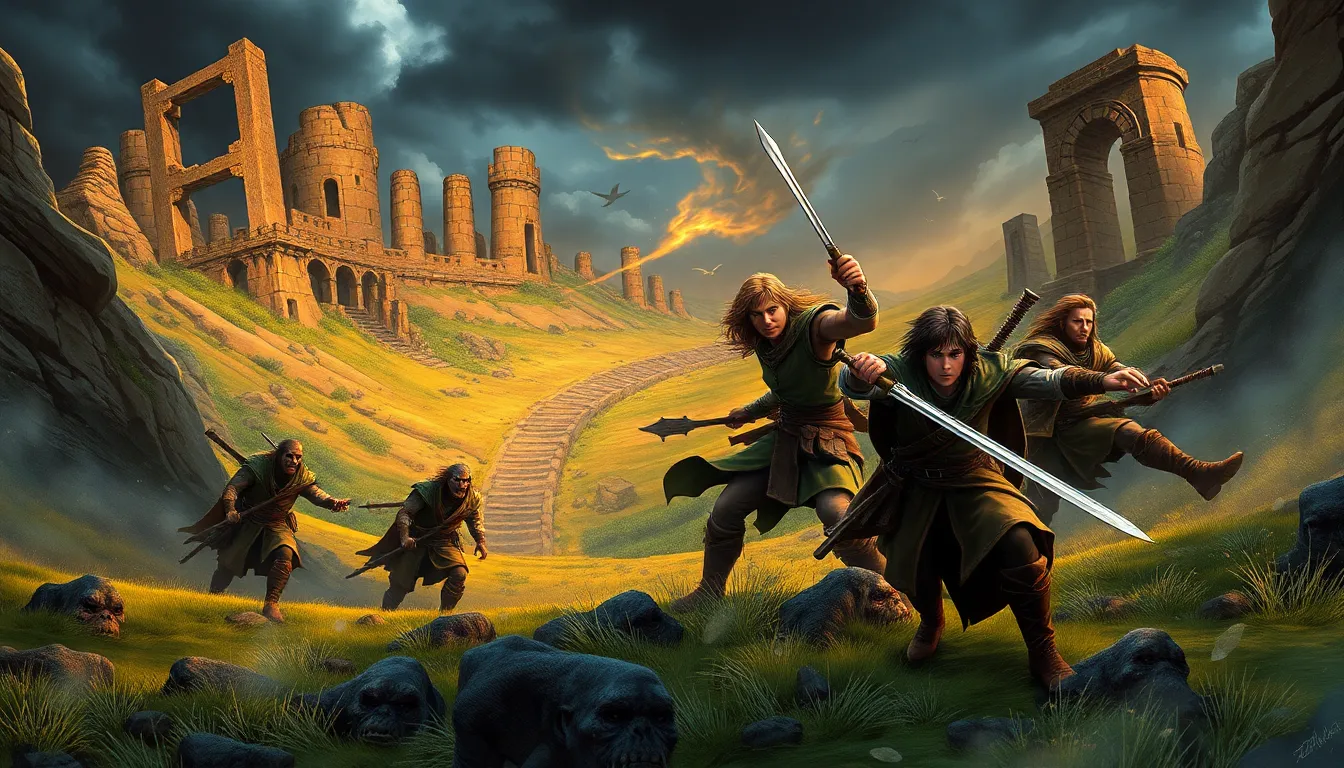In a world where hobbits can wield swords and orcs can’t seem to catch a break, the realm of Middle-earth has leaped off the pages and onto our screens through a myriad of video games. Whether players are sneaking through the Shire or battling it out in epic clashes against Sauron’s minions, the allure of “The Lord of the Rings” video games is undeniable. They’ve taken fans on wild adventures that even Frodo would envy.
From action-packed quests to strategic battles, these games offer something for everyone. So grab your controller and prepare to embark on a journey that’s more exhilarating than a ride on the back of an eagle. With each game, players dive deeper into the lore of J.R.R. Tolkien’s masterpiece, proving that even in the digital age, the spirit of adventure is alive and well in Middle-earth.
LOTR Video Games
The Lord of the Rings video games encompass a wide range of titles, each offering unique gameplay experiences. Released across various platforms, these games allow players to explore Middle-earth in different forms. Key genres include action-adventure, role-playing, and strategy, catering to diverse preferences.
Among the standout titles, “Middle-earth: Shadow of Mordor” features a dynamic combat system and a compelling story that expands Tolkien’s lore. This game highlights the nemesis system, which personalizes encounters with enemies, creating memorable interactions. Released in 2014, it received critical acclaim, solidifying its place in gaming history.
Another notable entry, “The Lord of the Rings: The Two Towers,” launched in 2002, combines film elements and gameplay for an immersive experience. Players assume the roles of beloved characters, fighting through iconic battles while advancing an overarching narrative.
The multiplayer experience shines in “The Lord of the Rings Online,” where players create custom characters and embark on quests with others in a vibrant alternate version of Middle-earth. This MMORPG has maintained a dedicated player base since its release in 2007, showcasing the enduring appeal of the franchise.
Recent developments include “Gollum,” a game set to delve deeper into the character of Gollum, focusing on stealth and puzzle elements. Scheduled for release in 2022, it promises a fresh perspective on the lore.
Overall, LOTR video games successfully capture the spirit of Tolkien’s work, allowing fans to immerse themselves in thrilling adventures throughout Middle-earth. Each title contributes to a rich tapestry of narratives, ensuring ongoing engagement with this legendary universe.
Popular Titles in the LOTR Franchise

The Lord of the Rings franchise features numerous notable video games, each inviting players to explore Middle-earth through unique gameplay experiences.
The Lord of the Rings: The Fellowship of the Ring
Released in 2002, this title closely follows the narrative of the first book and film. Players embark on a journey with Frodo, Sam, and the Fellowship to destroy the One Ring. The game blends action elements with RPG mechanics, allowing for character upgrades and skill development. Cinematic cutscenes enhance immersion, bringing J.R.R. Tolkien’s world vividly to life. Players engage in combat against orcs and other foes while exploring iconic locations like Rivendell and Moria.
The Lord of the Rings: The Two Towers
Arriving shortly after its predecessor, this game debuted in 2002 as well. It combines gameplay with scenes inspired by the movie adaptation. Players control heroes such as Aragorn, Legolas, and Gimli, battling through levels based on pivotal scenes from the film. The combat system emphasizes combos and special moves, facilitating fluid action during encounters. The cooperative multiplayer mode boosts engagement, allowing friends to join forces against evil.
Shadow of Mordor
Unveiled in 2014, Shadow of Mordor introduced an innovative Nemesis system. This unique mechanic lets players forge relationships with orc enemies, which evolve throughout the game. Set in an open-world format, it follows Talion, a ranger avenging his family’s demise at the hands of Sauron’s forces. Players unlock skills, wield powerful weapons, and tackle quests that immerse them deeper in Middle-earth’s lore. The game received acclaim for its engaging combat and rich storytelling.
Shadow of War
Released in 2017, Shadow of War expands upon the foundations established in Shadow of Mordor. The game enhances the Nemesis system, incorporating fortress sieges for strategic gameplay. Players continue Talion’s journey while managing relationships with various orc factions. Enhancements to combat and character progression make gameplay more dynamic. Rich environments and compelling narratives showcase the depth of Tolkien’s universe. The game adds layers to the lore and invites exploration across new regions of Middle-earth.
Gameplay Mechanics and Features
Gameplay in “The Lord of the Rings” video games incorporates various elements, engaging players with immersive experiences across different titles.
Storytelling Elements
Narratives play a crucial role in LOTR video games. Key story arcs often mirror Tolkien’s original works, allowing players to experience pivotal moments. Characters like Frodo, Legolas, and Gollum drive these stories, enriching interactions within the game world. Emotional depth enhances player investment, creating meaningful connections to the lore. The use of cinematics seamlessly integrates film scenes into gameplay, making each adventure more compelling. In “Middle-earth: Shadow of Mordor,” the personal journey of Talion adds layers to the overarching plot, while dynamic dialogue keeps players engaged. Overall, storytelling elevates the gaming experience, combining rich lore with interactive environments.
Combat and Exploration
Combat mechanics vary significantly across different LOTR titles. “Shadow of Mordor” employs a fluid combat system, allowing for combo attacks and special abilities. Players engage in fast-paced battles that require strategic decisions. In “The Lord of the Rings: The Two Towers,” cooperative gameplay enhances combat strategy, providing an opportunity for teamwork. Exploration also features prominently; vast environments encourage players to discover secrets, collectibles, and quests. “The Lord of the Rings Online” offers extensive exploration within a living game world, inviting continual engagement with new content. Environmental storytelling flourishes as treasures and hidden paths motivate thorough exploration, enriching the player’s journey through Middle-earth.
The Evolution of LOTR Video Games
The world of “The Lord of the Rings” video games has transformed significantly over the years. Each title reflects the changing landscape of gaming, catering to evolving player preferences.
Early Titles vs. Modern Adaptations
Early titles, like “The Fellowship of the Ring,” primarily focused on linear storytelling and character-driven narratives. Players followed the plot closely, often experiencing gameplay that mimicked the film’s structure. Modern adaptations, however, introduce expansive open worlds and dynamic interactions. “Middle-earth: Shadow of Mordor” exemplifies this shift. It allows players to forge unique relationships with enemies through the innovative Nemesis system. More freedom in exploration and diverse gameplay mechanics become key features in these contemporary releases. The focus now encompasses a rich tapestry of lore, giving gamers a deeper connection to Middle-earth.
Technological Advances in Game Design
Advancements in technology have revolutionized how LOTR games are designed. Graphics capabilities have improved, creating more immersive environments filled with detail. Modern game engines enhance realism, engaging players like never before. AI development has also progressed, allowing for smarter enemy behaviors and more challenging gameplay. Titles such as “Shadow of War” utilize these advancements, providing complex combat systems and strategic gameplay. Increased bandwidth supports online multiplayer experiences, enriching social interactions within “The Lord of the Rings Online.” These technological shifts foster deeper player immersion, solidifying the legacy of the LOTR franchise in the gaming industry.
Community and Cultural Impact
The LotR video games foster a vibrant community of fans and gamers passionate about J.R.R. Tolkien’s universe. Engagement thrives through forums and social media, with players sharing strategies, fan art, and gameplay experiences. This interaction cultivates a sense of belonging, as many gather for events like conventions, where they discuss their favorite games and characters.
Cultural impact extends beyond gaming. The immersive worlds inspire creativity, leading to fan-created content such as mods, videos, and artwork. Players often revisit the themes of heroism and friendship found in Tolkien’s works, enhancing their connection to the lore. Game titles like “The Lord of the Rings Online” allow users to explore quests together, promoting collaboration and social interaction.
In addition, the richness of the storylines offers educational opportunities. Players delve into the themes of good versus evil, leadership, and sacrifice, enhancing discussions around literature and morality. Notable events, such as anniversaries of significant game releases, often prompt renewed interest and celebrations within the community.
Various crossover events also highlight the games’ cultural reception. Collaborations with pop culture franchises and themed merchandise reinforce the importance of these video games in the broader entertainment landscape. They not only entertain but also promote discussions about adaptation and preservation of Tolkien’s legacy in modern media.
Overall, the sustained popularity and influence of LotR video games reflect their role in connecting fans to Middle-earth. Through gaming, the rich narrative and community interactions continue to inspire and engage audiences of all ages.
Conclusion
The allure of “The Lord of the Rings” video games continues to captivate players everywhere. With their rich narratives and immersive gameplay, these titles offer fans a unique way to experience Middle-earth. From epic battles to strategic conquests, each game provides a fresh perspective on Tolkien’s legendary universe.
As technology evolves, so does the potential for even more engaging adventures. The community surrounding these games thrives on shared experiences and creativity, ensuring that the spirit of Middle-earth remains alive. Whether players are revisiting classic titles or exploring new releases, the journey through this beloved world is always worth embarking on.

